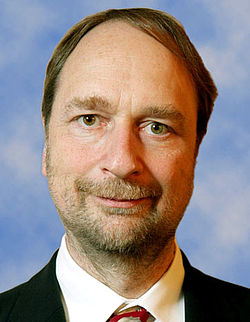September 21, 2015 (extended)
Cooperating with smart objects: Humans in the loop!
Abstract
We embed ever smaller processors in physical objects, network them with other smart things, analyze their sensed data somewhere in a cloud, and optimize real-world processes based on the knowledge gained. The application areas and business scenarios that benefit from Internet of Things technologies are abundant: Wind farms increase their yield, logistic chains are improved, and traffic patterns in whole cities become transparent – to mention only three somewhat arbitrary examples. Many of those classical scenarios are characterized by the fact that they work almost fully automatic - humans are out of the loop. So far, so good.
But with further technical progress and cost reduction, also more and more consumer products and everyday items in our direct personal environments will become smart ("hello Barbie, can you hear me?") and connected to the Internet and its ecosystem. People will communicate - first with their devices, and later also with many of their more mundane belongings. But when people are in the loop, things get interesting and often complicated. Already the problem how and by what technical means we can communicate with our friendly personal objects is an issue - but when these objects do become really smart, communication is only a means to a higher purpose: cooperation. This gives rise to a number of interesting questions: How, in fact, do we cooperate with smart objects? Do they understand what we want? Do we always understand them? Even scenarios with such seemingly simple smart things as learning thermostats or robot vacuum cleaners are non-trivial in that respect.
There will certainly be much to explore in a future world where people are not out of the loop, but in the loop of communicating smart objects. And that future may be closer than we think.
Presenter

Friedemann Mattern is a Professor of Computer Science at ETH Zurich, Switzerland. He was the founding director of the Institute for Pervasive Computing and heads the distributed systems and ubiquitous computing research group. Before being appointed by ETH Zurich in 1999, Mattern was Professor at Saarland University in Saarbrucken and at TU Darmstadt, Germany. He received his PhD from the University of Kaiserslautern, Germany, in 1989.
Mattern has written about 200 research articles and published several books. His main research fields are distributed algorithms, ubiquitous computing, and the Internet of Things, but he is also interested in the far-reaching implications of the increasing digitalization of everyday life. He is an editorial board member of a number of research journals and book series, and he also acts as a scientific and strategic advisor to several research councils. Furthermore, he has initiated and chaired a number of international conferences and is involved in various research projects, often in cooperation with industrial partners. Mattern is a member of the German National Academy of Sciences, of acatech (the German Academy of Science and Engineering), and of the Academia Europaea.
Important Dates
Main Track
September 28, 2015 (extended)
December 1, 2015
December 18, 2015
Posters & Demos
December 8 AOE, 2015 (EXTENDED!)
December 18, 2015
December 23, 2015
Competition
October 7, 2015 (extended)
October 21, 2015
December 16, 2015
Workshops
Nov 16, 2015 (extended)
December 7, 2015
December 20, 2015